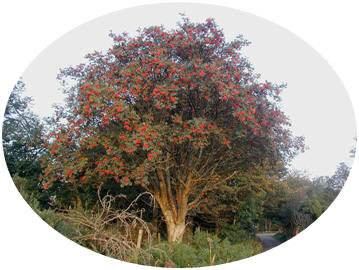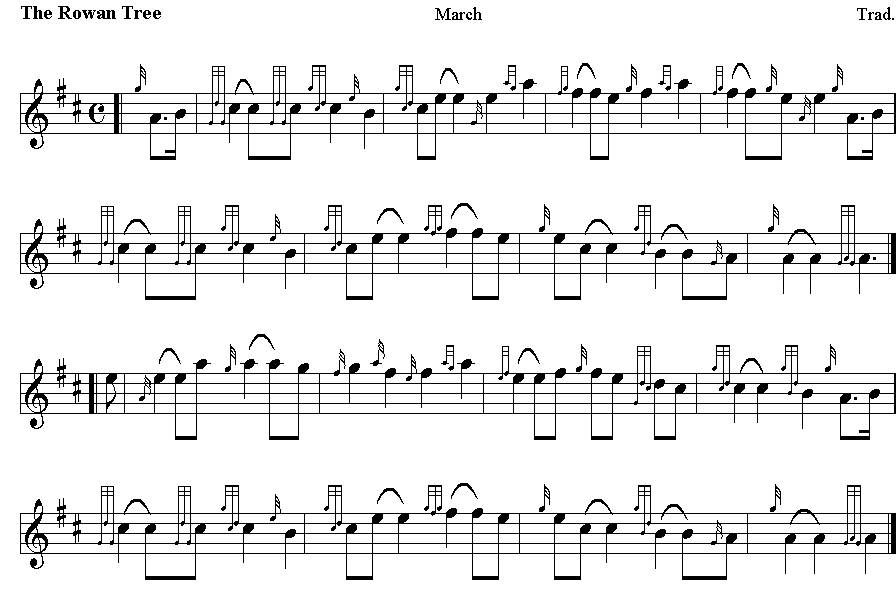 |
||||

Best viewed in
|
The rowans or mountain-ashes are shrubs or small trees. The name "rowan" is derived from the Old Norse name for the tree, raun. Linguists believe that the Norse name is ultimately derived from a proto-Germanic word *raudnian meaning "getting red" and which referred to the red foliage and red berries in the autumn. Rowan is one of the familiar wild trees in the British Isles, and has acquired numerous English folk names. The following are recorded folk names for the rowan: Delight of the eye (Luisliu), Mountain ash, Quickbane, Quickbeam, Quicken (tree), Quickenbeam, Ran tree, Roan tree, Roden-quicken, Roden-quicken-royan, Round wood, Round tree, Royne tree, Rune tree, Sorb apple, Thor's helper, Whispering tree, Whitty, Wicken-tree, Wiggin, Wiggy, Wiky, Witch wood, Witchbane, Witchen, Witchen Wittern tree. Many of these can be easily linked to the mythology and folklore surrounding the tree. In Gaelic, it is caorann, or Rudha-an (red one, pronounced quite similarly to English "rowan"). The rowan tree has a long tradition in European mythology and folklore. It was thought to be a magical tree and protection against malevolent beings. It was said in England that this was the tree on which the Devil hanged his mother. The density of the rowan wood makes it very usable for walking sticks and magician's staves. This is why druid staffs, for example, have traditionally been made out of rowan wood, and its branches were often used in dowsing rods and magic wands. Rowan was carried on vessels to avoid storms, kept in houses to guard against lightning, and even planted on graves to keep the deceased from haunting. It was also used to protect one from witches. Often birds' droppings contain rowan seeds, and if such droppings land in a fork or hole where old leaves have accumulated on a larger tree, such as an oak or a maple, they may result in a rowan growing as an epiphyte on the larger tree. Such a rowan is called a "flying rowan" and was thought of as especially potent against witches and their magic, and as a counter-charm against sorcery.Rowan's alleged protection against enchantment made it perfect to be used in making rune staves, for metal divining, and to protect cattle from harm by attaching sprigs to their sheds. Leaves and berries were added to divination incense for better scrying. The lyrics were penned by Lady Nairne. Carolina Oliphant, Baroness Nairne (August 16, 1766–October 26, 1845) was a Scottish songwriter and song collector. Carolina Oliphant was born in the auld hoose of Gask, Perthshire. She was descended from an old family which had settled in Perthshire in the 13th century, and could boast of kinship with the royal race of Scotland. Her father, Laurence Oliphant, was one of the foremost supporters of the Jacobite cause, and she was named Carolina in memory of Prince Charles Edward Stuart. In the schoolroom she was known as pretty Miss Car, and afterwards her striking beauty and pleasing manners earned for her the name of the Flower of Strathearn. In 1806 she married William Murray Nairne, who became the 5th Baron Nairne in 1824. After her husband's death in 1830 Lady Nairne took up her residence at Enniskerry, Co. Wicklow, Ireland, but she spent much time abroad. She died at Gask on the 26 October 1845. Following the example set by Robert Burns in the Scots Musical Museum, Lady Nairne undertook to bring out a collection of national airs set to appropriate words. To the collection she contributed a large number of original songs, adopting the signature BB - Mrs Bogan of Bogan. The music was edited by RA Smith, and the collection was published at Edinburgh under the name of the Scottish Minstrel (1821-1824).
Lyrics by Lady Nairne
|
|||

